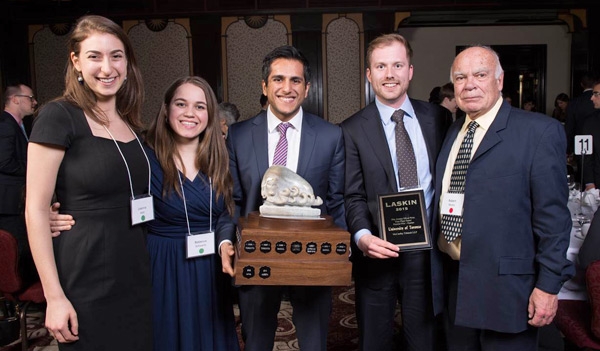Bringing home the cup: Laskin Moot winners Leanna Katz, Rebecca Schwartz, Bilal Manji and Dave Marshall, with Justice Robert Decary
By Lucianna Ciccocioppo
Our law students dominated the mooting season this year with 10 first-place victories in a variety of competitions, thanks to the hard work of an amazing trifecta of student skill, faculty and alumni support.
Kicking off the list of first place finishes was the National Labour Arbitration Moot, followed by the Wilson, Diversity, Gale Cup, Laskin, Corporate Securities, Walsh Family Law, Arnup Cup, Environmental Law and the Commonwealth Moots.
Law students also did exceptionally well in the consensus-based Kawaskimhon Aboriginal Rights Moot, and placed well in the Fox Intellectual Property, Jessup International Law, Sopinka, Winkler Class Actions and Donald G. H. Bowman National Tax Moots.
“I am very proud of our law school's outstanding performance in this year’s moots," says Dean Ed Iacobucci. "The students at this Faculty of Law are remarkably talented and dedicated, and our mooting success this year is a further illustration of their gifts. But even they cannot do it alone, and the results are also testament to the wonderful community that is this law school, with invaluable support coming from other student coaches and mentors, faculty advisors, and top-notch legal practitioners.”
Sara Faherty, assistant dean, applauds all the students involved in the moots, and stresses they “provide the energy that drives the program.”
Mooters are coached by the students who argued that moot the previous year, explains Faherty. “So each set of mooters has a pretty impressive and synergistic team behind them: their peer coaches, the faculty who provide advice on structuring the legal arguments and often give feedback on written submissions, and the committed practitioners who serve as adjunct mooting advisors who do the same, judge practice rounds and develop the students' appellate litigation skills.”
Adds Faherty: “The mooting teams are a terrific mix of students, faculty, and the strongest practitioners from the local bar. When we began leveraging faculty support with these outstanding practitioners, many who are our alumni, we knew we had a winning combination.”
Lauren Harper, 3L, served as a member of the Moot Court Committee this year. She coached the Environmental Law Moot with Jen Bates, and the Laskin Moot with Kat Owens.
“The Laskin and Environmental teams both worked incredibly hard all semester, perfecting both their written advocacy and oral advocacy,” says Harper. “I am still amazed by Leanna Katz flawlessly arguing admin law in French.” Their dedication paid off: first place prizes for both teams, team awards and oralist awards. “I hope that many of the students who participated this year stay involved in the program as coaches to continue the success of the U of T Law mooting program.”
In recent years, the law school has added various other moots focusing on upper-year subjects. These include: the Bowman Tax Moot, Fox Intellectual Property Moot, Isaac Diversity Moot, Walsh Family Law moot, Willms & Shier Environmental Law Moot, and the Winkler Class Action Moot.
These newer competitions tie the mooting program into the curriculum. “It strengthens the students' experience in the subjects, as well as adding a different mode of learning to the mix,” says Faherty.
While some faculty members have long been involved in the mooting program (Professors Lorraine Weinrib, Simon Stern, and Anita Anand, for example) others were not that involved until their teaching and research area became the subject of a moot. Prof. Ben Alarie now works with the tax mooters, and Prof. Carol Rogerson is extremely dedicated to the family law mooters.
“Supervising the Walsh Moot for the past two years has been a fabulous experience,” says Rogerson. “I think the moots provide one of the best learning experience that we offer our students—very ‘hands-on’, interactive learning.”
She enjoys working with students who are required “to analyze issues critically and assess the strengths and weaknesses of arguments.” Feedback from the faculty supervisors and student coaches mean the mooters write and rewrite their factums and rewrite them again, adds Rogerson.
“They refine their oral arguments through the course of up to a dozen run-throughs and learn how to deal with hard questions—and sometimes fairly blunt criticism. Students develop incredible skills and confidence,” Rogerson explains. And her favourite part is when it’s over.
“The final day of the moot is this wondrous moment for me as a supervisor—when I see the often shy, soft-spoken, hesitant students I met on the first day transformed into confident, articulate advocates.”
The Faculty of Law extends its congratulations to all the student participants and is grateful for the faculty and alumni supervisors!
Have a look at this video featuring the U of T Law team's first-place finish at the 2015 Willms & Shier Environmental Law Moot.
2015 Willms & Shier Environmental Law Moot from Patricia Izumi Van Rooyen on Vimeo.

